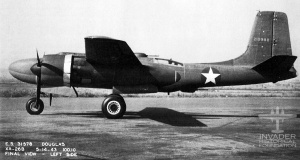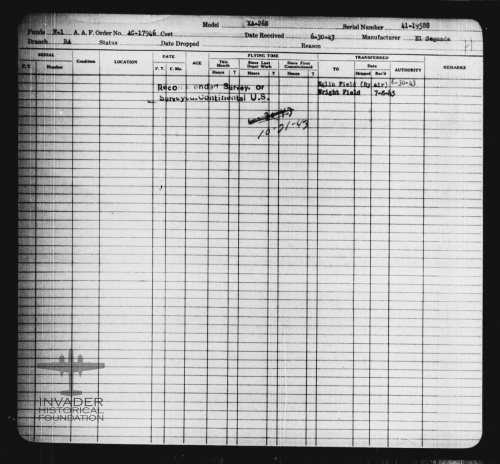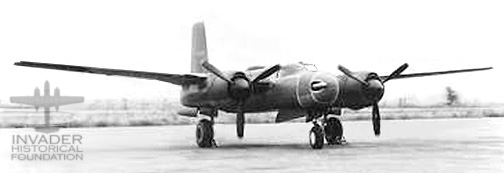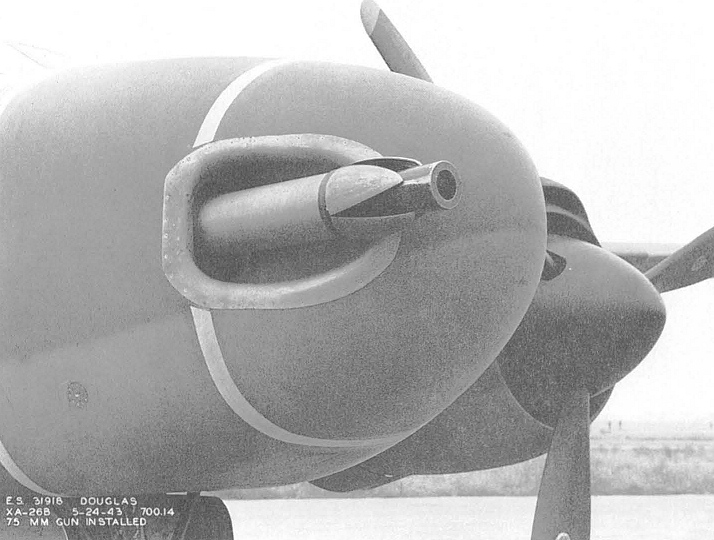41-19588: Difference between revisions
(→Images) |
No edit summary |
||
| Line 52: | Line 52: | ||
|'''Nose Guns:''' 1x 75mm Cannon | |'''Nose Guns:''' 1x 75mm Cannon | ||
|- | |- | ||
|'''Dorsal Turret:''' | |'''Dorsal Turret:''' 2x .50 caliber machine guns | ||
|- | |- | ||
|'''Ventral Turret:''' | |'''Ventral Turret:''' 2x .50 caliber machine guns | ||
|- | |- | ||
|'''Payload:''' 6,000 lbs | |'''Payload:''' 6,000 lbs | ||
| Line 64: | Line 64: | ||
This plane was the third working A-26 Prototype to be fully operational. In July of 1941 Douglas built a full-sized mock-up of the plane with dummy weapons to pitch to the Air Force. That initial display culminated in a contract for two operational prototypes - [[41-19504]] (The XA-26), and the [[41-19505]] (XA-26A). Later, the Air Force added a third prototype, the XA-26B (41-19588). | This plane was the third working A-26 Prototype to be fully operational. In July of 1941 Douglas built a full-sized mock-up of the plane with dummy weapons to pitch to the Air Force. That initial display culminated in a contract for two operational prototypes - [[41-19504]] (The XA-26), and the [[41-19505]] (XA-26A). Later, the Air Force added a third prototype, the XA-26B (41-19588). | ||
This plane was constructed with a solid nose and tested both with and without the 75mm cannon in the nose. | This plane was constructed with a solid nose and tested both with and without the 75mm cannon in the nose. Some sources report that this plane did not have the .50 caliber machine guns installed in the turrets, however photographic evidence shows this claim to be false. | ||
There is less information on this particular plane than there is on the XA-26. | There is less information on this particular plane than there is on the XA-26. | ||
Revision as of 17:11, 14 September 2019
| XA-26B Invader | |||
|---|---|---|---|
| Builders: Douglas Aircraft Company | |||
| Operators: United States Air Force | |||
| Ordered 1941 | |||
| Number Built: 1 | |||
| First Built: 1942 | |||
| GENERAL CHARACTERISTICS | |||
| Type: Light Attack Bomber | |||
| Dry Weight: - | |||
| Wet Weight: - | |||
| Length: 51' 3" (15.24 m) | |||
| Height: 18' 6" (5.64 m) | |||
| Wingspan: 70' (21.34 m) | |||
| Wing Area: 540 Sq. Feet (50.17 m²) | |||
| Speed: - | |||
| Max Speed: - | |||
| Ceiling: 22,100 feet (6,700 m) | |||
| Powerplant: 2x Pratt & Whitney R-2800-27 | |||
| Horsepower: 2,000 | |||
| Fuel Capacity: - | |||
| Range: - | |||
| Crew: 3 | |||
| Passengers: 1 | |||
| ARMAMENT | |||
| Nose Guns: 1x 75mm Cannon | |||
| Dorsal Turret: 2x .50 caliber machine guns | |||
| Ventral Turret: 2x .50 caliber machine guns | |||
| Payload: 6,000 lbs | |||
See also: List of Invaders by Serial Number
This plane was the third working A-26 Prototype to be fully operational. In July of 1941 Douglas built a full-sized mock-up of the plane with dummy weapons to pitch to the Air Force. That initial display culminated in a contract for two operational prototypes - 41-19504 (The XA-26), and the 41-19505 (XA-26A). Later, the Air Force added a third prototype, the XA-26B (41-19588).
This plane was constructed with a solid nose and tested both with and without the 75mm cannon in the nose. Some sources report that this plane did not have the .50 caliber machine guns installed in the turrets, however photographic evidence shows this claim to be false.
There is less information on this particular plane than there is on the XA-26.
This plane served as a secondary prototype for what would become the B model Invader - those equipped with hard noses and heavy machine gun armament. One observable difference between the prototype models and the production models was the "propeller spinner" - the cone-shaped piece in the middle of the propeller blades. The prototype units were equipped with this feature, but none of the production models had them.
Differences between the XA-26B and the other XA prototypes were the addition of a third crew seat. The first two invaders were designed to be flown by a crew of two, but this one was deigned with three - Pilot, Navigator/Radioman, and Gunner.
This plane served as the prototype for what would eventually become the A-26B model. The 75mm nose cannon had some modifications on the production version; the gun had a fairing that bulged out of the nose on the production model, rather than a scoop on this version (See 41-39108 for an example of this), the flower-petal sheath on the end of the barrel was also removed on the production version. In examining the photos in the photo section below it also appears that this plane initially had a different landing gear. There are at least two photos where the front landing gear is a straight bar with the tire on one side of it. Production models had a bar that came down and then bent so that the tire ended up directly under the gear trunk.


Operational History
This plane was purpose built as a prototype for testing. It had an extremely short life span of only 4 months in service before it was scrapped.
30 JUN 1943 - Accepted by USAF, flown to Eglin Field, FL.
8 JUL 1943 - Assigned to Wright AFB, OH.
19 OCT 1943 - At Eglin AFB, involved in a serious crash with fatally injured the pilot.
21 OCT 1943 - Struck from service.
Accidents
- 19 OCT 1943 - The plane crashed while at Eglin Field, Valpariso, FL. The Pilot, Walter J. Wagner, was killed in the crash due to a fire.
Crew
Walter J. Wagner - Pilot
Disposition
This plane was struck from the records at the end of its testing.
Images
Luckily, being a prototype model, there are some images of this plane.
The XA-26B Prototype in profile.
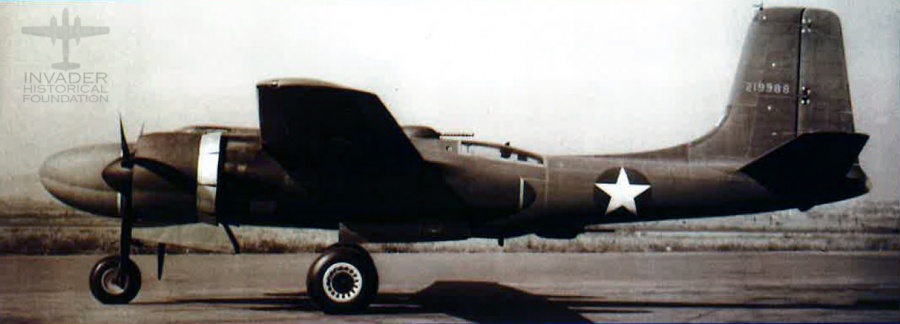
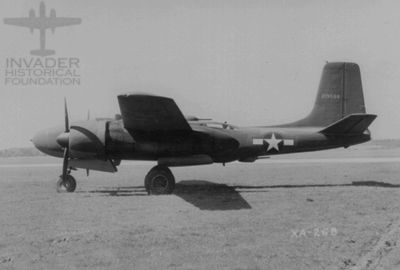
The XA-26B Protoype from the front.

The XA-26B Protoype without the 75mm Cannon.
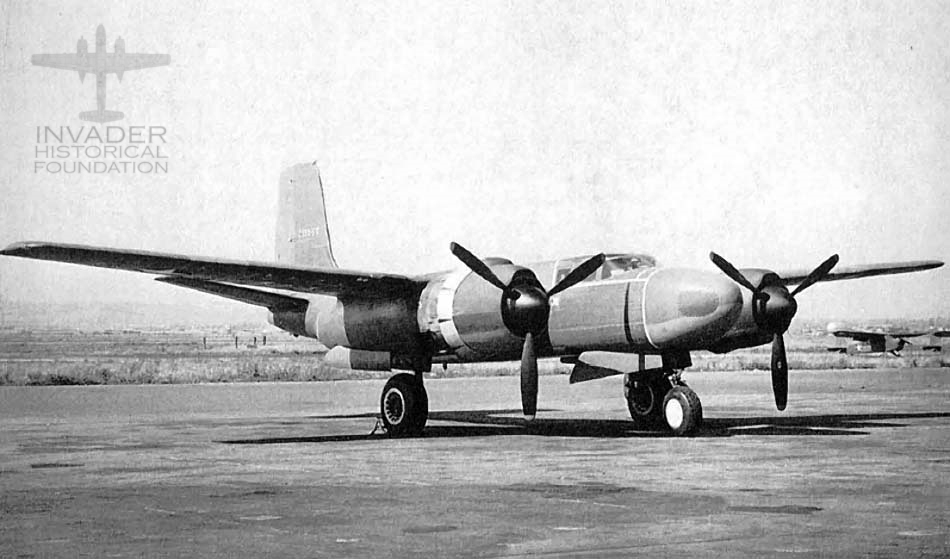
The XA-26B prototype at the Douglas factory.
File:XA-26B real.jpg
